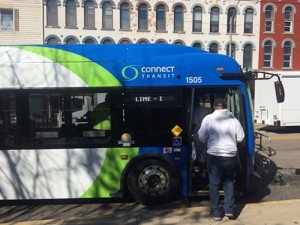Changes could be ahead for Connect Transit’s operations plan
Dave Fidlin for Chronicle Media — November 24, 2015

Route efficiency and consumer demands are the impetus for Connect Transit officials to conduct a review of the current system. (Photo from Connect Transit)
Early this month, Connect Transit, Bloomington and Normal’s long-running mass transit system, transitioned to a so-called fixed route service that will require passengers be stationed at specific locations.
But that change may be just the first in a series of steps in altering Connect Transit’s service to passengers in Bloomington and Normal.
Connect Transit officials in April enlisted the services of San Francisco-based Nelson Nygaard, a San Francisco-based consulting firm that specializes in planning transportation systems. In recent months, staffers within Nelson Nygaard have unveiled a series of potential recommendations aimed at creating more efficient routes.
One such change is the fixed-route set-up. Green-colored signs with Connect Transit’s logo are being placed at strategic stops throughout Bloomington and Normal. As part of the change, drivers will no longer make special pick-ups for passengers in non-designated areas.
Speaking to the previous system, Kyle Boehm, a planner with Connect Transit, said it created for a series of inefficiencies for the mass transit provider and, at times, for the motorists sharing the roadway with the buses.
“When there’s a lot of traffic, that causes the buses to slow down,” Boehm said. “People miss their connections.”
In the months ahead, Connect Transit is considering an even greater number of changes. Depending on how the proposals are viewed, the changes can either be seen as expanding or contracting service.
With Nelson Nygaard’s recommendations taken into account, Connect Transit officials are considering an expansion to the number of stops weekdays and, perhaps, add Sunday service to its operations plan. At the same time, Connect Transit’s overall coverage area could shrink.
At the moment, General Manager Andrew Johnson said the amount of revenue Connect Transit generates would not be enough to accommodate the ramped up weekday stops and add Sunday service. One of the two scenarios, however, appears possible.
Johnson and other Connect Transit officials held a series of listening sessions in October, and a majority of respondents attending the sessions favored additional weekday stops.
One wild card in the long range planning is the impending increase in tax revenue, which takes effect Jan. 1. Elected officials in the city of Bloomington and town of Normal agreed earlier this year to increase the sales tax rate from 7.75 percent to 8.75 percent.
Annually, the tax increase is expected to generate $9.6 million in revenue for Bloomington and $6 million in revenue for Normal. Officials in Normal have expressed interest in allocating some of the tax income toward Connect Transit’s operations. Bloomington, however, has yet to commit any additional sales tax proceeds toward mass transit.
Proponents of the sales tax hike cited a desire to address a series of capital projects that have been on the back burner in recent years because of budget constraints.
Johnson said he believed the additional weekday stops and Sunday expansion both could be feasible if some of the sales tax proceeds went toward the organization’s operations.
“We have a very realistic ability to do that if we can secure the funding,” Johnson said.
For more information or to leave feedback on Connect Transit’s proposed changes:
Call (309) 828-9833
Email info@connect-transit.com
Visit www.connecttransitcoa.com
—Changes could be ahead for Connect Transit’s operations plan–







